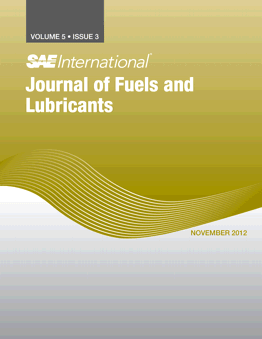
SAE International Journal of Fuels and Lubricants
Scope & Guideline
Pioneering Research for a Greener Tomorrow
Introduction
Aims and Scopes
- Fuels and Combustion Behavior:
The journal explores various fuel types, blends, and their combustion characteristics, including performance and emissions in different engine configurations. - Lubrication Technologies:
Research on lubricants, including their formulation, tribological properties, and interactions with engine components, is a core area of focus. - Environmental Impact and Emissions Control:
The journal addresses the environmental implications of fuel and lubricant usage, focusing on emissions reduction technologies and sustainable practices. - Innovative Engine Technologies:
A consistent emphasis is placed on new engine technologies, including hybrid systems and advanced combustion strategies, to improve efficiency and performance. - Data-Driven Modeling and Simulation:
Utilization of machine learning and advanced modeling techniques to predict fuel and lubricant performance, as well as their effects on engine operation.
Trending and Emerging
- Sustainable Fuels and Biofuels:
There is an increasing focus on the development and assessment of sustainable fuels, including biofuels and synthetic fuels, which aim to reduce carbon footprints and enhance engine performance. - Advanced Combustion Techniques:
Research on advanced combustion strategies, such as partially premixed combustion and reactivity-controlled compression ignition, is gaining traction as a means to improve efficiency and reduce emissions. - Artificial Intelligence and Machine Learning Applications:
The application of AI and machine learning for predictive modeling and optimization of fuel and lubricant performance is a rapidly emerging theme, enhancing research capabilities and outcomes. - Hybrid and Electric Vehicle Technologies:
As the automotive industry shifts towards electrification, research related to hybrid and electric vehicle systems, including engine oil degradation and performance, is increasingly prominent. - Fuel Quality Assessment and Monitoring:
Emerging studies focus on real-time monitoring and assessment of fuel quality using advanced sensors and analytical methods, reflecting the need for improved fuel management systems.
Declining or Waning
- Traditional Fuel Testing Methods:
There has been a noticeable decrease in studies focused on conventional fuel testing methods such as ASTM standards, as researchers shift towards innovative and real-world testing approaches. - Basic Performance Comparisons:
Research centered solely on basic performance comparisons of conventional fuels is waning, possibly due to the growing complexity of fuels and the need for more nuanced studies that incorporate various factors. - Static Engine Testing:
The reliance on static testing methods for engine performance evaluation is declining, with a move towards dynamic and real-world testing scenarios that provide more relevant data. - Focus on Single-Fuel Studies:
There is a decreasing emphasis on studies that examine the performance of a single fuel type in isolation, as more research embraces the complexity of fuel blends and hybrid systems. - Generalized Emission Studies:
Research that lacks specificity in emission studies, without considering the interactions between fuel types and engine technologies, is becoming less frequent.
Similar Journals

Applications in Energy and Combustion Science
Igniting Innovation in Energy and Combustion ResearchWelcome to Applications in Energy and Combustion Science, a premier open-access journal published by ELSEVIER that has been at the forefront of research since 2020. With the ISSN 2666-352X, this journal is dedicated to advancing the knowledge and application of energy technologies and combustion systems, reflecting a strong commitment to the evolving demands of the field. Based in the United Kingdom and recognized for its robust contributions, it has achieved noteworthy status in the 2023 rankings: a Q1 classification in both Chemical Engineering (miscellaneous) and Fuel Technology, alongside a Q2 standing in Energy (miscellaneous). Researchers will find it a significant platform, with Scopus rankings placing it among the top tiers in various categories. This journal offers an essential resource for professionals and students aiming to stay abreast of innovative developments and applications in the critical areas of energy and combustion, ensuring broad accessibility and dissemination of research findings.
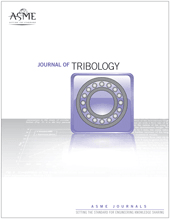
JOURNAL OF TRIBOLOGY-TRANSACTIONS OF THE ASME
Exploring the Dynamics of Wear and LubricationJOURNAL OF TRIBOLOGY-TRANSACTIONS OF THE ASME, published by the esteemed American Society of Mechanical Engineers (ASME), is a prominent peer-reviewed journal dedicated to the intricate study of tribological phenomena and their impact on mechanical systems. With an ISSN of 0742-4787 and an E-ISSN of 1528-8897, this journal has been a vital resource since its inception in 1967, covering significant developments in mechanical engineering, mechanics of materials, surfaces, and interfaces. Ranked in the Q2 quartile across multiple categories for 2023, including Mechanical Engineering and Surfaces and Interfaces, it reflects a respectable impact within the research community, with Scopus rankings highlighting its stature in various related fields. While it does not offer open access, its contributions to the understanding of wear, lubrication, and surface engineering are invaluable for researchers, professionals, and students alike, fostering advancements in both academic and industrial applications. With a commitment to disseminating high-quality research, this journal continues to be an essential platform for those seeking to push the boundaries of tribology and its applications.

Fuels
Bridging Research and Real-World Applications in FuelsFuels is a premier open-access journal published by MDPI, focusing on the multifaceted field of fuel science, technology, and applications. Since its inception in 2020, this journal (E-ISSN: 2673-3994) has rapidly become a vital resource for researchers, professionals, and students engaged in the exploration of sustainable fuel alternatives, combustion technologies, and energy conversion processes. Located in Basel, Switzerland, Fuels aims to disseminate high-quality research that not only advances academic understanding but also addresses real-world energy challenges. By embracing an open-access format, it ensures that significant findings are readily available to the global scientific community, helping to foster collaboration and innovation in the transition to cleaner energy solutions. With an emphasis on interdisciplinary research and practical applications, Fuels is poised to be a leading journal that shapes the future of energy technologies.
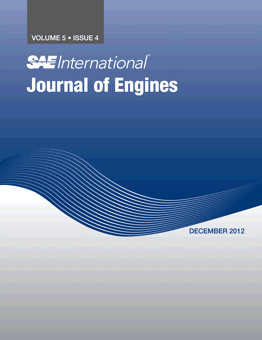
SAE International Journal of Engines
Catalyzing Progress in Automotive Fuel TechnologySAE International Journal of Engines, published by SAE International, serves as a leading platform in the field of automotive engineering and fuel technology. Established in 2008, this journal has quickly gained recognition, achieving a Q2 ranking in Automotive Engineering and a Q3 ranking in Fuel Technology as of 2023. With the journal's ongoing commitment to advancing the understanding of engine technologies, it encompasses a diverse range of topics including engine performance, emissions, fuels, and innovative technologies driving the automotive industry. Researchers and professionals can benefit from the high-quality peer-reviewed articles that the journal features, while the comprehensive content serves as an invaluable resource for students engaged in automotive studies. Although it does not currently offer open access, the journal's credibility is further reinforced by its respectable Scopus rankings, indicating its significant impact within the academic community. For anyone seeking to stay at the forefront of engine research and automotive advancements, the SAE International Journal of Engines is an essential resource.
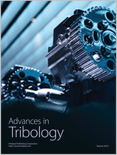
Advances in Tribology
Pioneering Research in Tribological ScienceAdvances in Tribology is a premier open access journal published by HINDAWI LTD, focused on the rapidly evolving fields of tribology, mechanical engineering, and materials science. Since its inception in 2008, the journal has provided a crucial platform for researchers, professionals, and students to disseminate knowledge and advancements in the understanding of friction, wear, and lubrication phenomena. With an impact factor reflective of its significance, Advances in Tribology is ranked in the Q3 category for both Mechanical Engineering and Surfaces, Coatings, and Films as of 2023, situating it among the prominent journals in its field. The journal's commitment to high-quality research is evident in its rigorous peer-review process and its dedication to fostering open access, allowing for widespread dissemination of impactful research. Published in Egypt with global reach, this journal aims to bridge the knowledge gap in tribological applications and innovations, serving as a key resource for those engaged in the study and application of surface interactions.
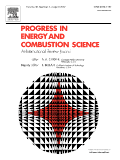
PROGRESS IN ENERGY AND COMBUSTION SCIENCE
Illuminating the path to efficient energy technologies.PROGRESS IN ENERGY AND COMBUSTION SCIENCE, published by PERGAMON-ELSEVIER SCIENCE LTD, stands as a premier journal in the realms of energy engineering and fuel technology, with an impressive impact factor and recognition across multiple scientific disciplinary matrices. Since its inception in 1975 and continuing through 2024, this esteemed publication has contributed significantly to the advancement of knowledge in energy resources, combustion processes, and their applications in modern technology. With a robust ranking of Q1 in key categories such as Chemical Engineering, Energy Engineering and Power Technology, and Fuel Technology, the journal consistently showcases high-quality research that influences both academia and industry. Researchers, professionals, and students benefit from its rigorous peer-reviewed articles, which foster a deeper understanding of energy-related challenges and innovations. Although it is not an Open Access outlet, its relevance and contribution to the scientific community are undeniable, making it a vital resource for anyone engaged in the pursuit of sustainable energy solutions.
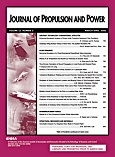
JOURNAL OF PROPULSION AND POWER
Advancing the Frontiers of Aerospace InnovationJOURNAL OF PROPULSION AND POWER, published by the American Institute of Aeronautics and Astronautics, is a premier peer-reviewed journal dedicated to the advancement of knowledge in the fields of aerospace engineering, mechanical engineering, and fuel technology. With an impressive impact factor and ranked in the Q1 and Q2 categories for various relevant fields, the journal serves as a vital resource for researchers, professionals, and students alike who are looking to stay abreast of the latest innovations and breakthroughs in propulsion systems and power generation methodologies. Established in 1985, the journal covers a wide range of topics, ensuring a comprehensive understanding of propulsion technologies from atmospheric to space applications. Its robust Scopus rankings highlight its significance in the academic community, establishing it as a leading forum for sharing pivotal research findings and fostering collaborative dialogues that drive the aerospace industry forward. Located in Reston, Virginia, the journal does not currently offer open access options, yet it remains accessible to a vast audience via academic institutions and libraries. As we move further into the 21st century, the JOURNAL OF PROPULSION AND POWER continues to be an indispensable tool for the exploration and evolution of propulsion and power systems.
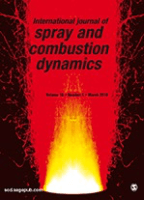
International Journal of Spray and Combustion Dynamics
Bridging Theory and Application in Combustion ScienceWelcome to the International Journal of Spray and Combustion Dynamics, a premier publication dedicated to advancing the understanding of spray and combustion phenomena in various applications. Published by SAGE Publications Inc, this journal serves as a vital resource for researchers and professionals in the fields of Automotive Engineering, Energy Engineering, and Physics, boasting a commendable Q2 ranking in its categories for 2023. With an ISSN of 1756-8277 and E-ISSN 1756-8285, it engages a global audience in the investigation of innovative solutions to energy efficiency and combustion processes. Operating from the United Kingdom, this journal is a key player in disseminating high-quality research findings from 2011 to 2024, making it a go-to source for those seeking to enhance their knowledge and contribute to cutting-edge developments in these dynamic areas of study. Researchers, practitioners, and students alike will find this journal invaluable for staying informed and connected to the latest advancements in spray and combustion dynamics.
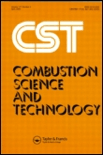
COMBUSTION SCIENCE AND TECHNOLOGY
Illuminating the Path of Combustion InnovationCOMBUSTION SCIENCE AND TECHNOLOGY, published by Taylor & Francis Inc, is a pivotal journal in the fields of Chemical Engineering and Chemistry, with a robust history spanning from 1969 to 2024. With an established impact factor and a strong reputation reflected in its Q2 ranking in both Chemical Engineering and Chemistry, this journal serves as an essential resource for researchers and professionals dedicated to the intricacies of combustion processes and energy technologies. The journal also holds commendable rankings in Energy Engineering, Fuel Technology, and Physics and Astronomy, showcasing its interdisciplinary relevance. While currently not an open-access publication, it offers a wealth of knowledge through its meticulously peer-reviewed articles, which are crucial for advancing understanding and innovation in combustion science. With a commitment to promoting rigorous research and fostering scholarly communication, COMBUSTION SCIENCE AND TECHNOLOGY is indispensable for anyone seeking cutting-edge insights into combustion phenomena and their applications in various engineering fields.

FLOW TURBULENCE AND COMBUSTION
Exploring the complexities of turbulence and its applications.Flow Turbulence and Combustion is a premier peer-reviewed journal published by Springer, focusing on the intricate dynamics of fluid mechanics, turbulence, and combustion phenomena. With an impressive impact factor and categorized in the Q1 quartile across Chemical Engineering, Physical and Theoretical Chemistry, and Physics and Astronomy, this journal serves as an invaluable resource for researchers, professionals, and students engaged in these fields. Founded in 1996, it presents cutting-edge research, comprehensive reviews, and innovative methodologies that advance the understanding of turbulent flow and combustion processes. The journal's commitment to open access ensures broad dissemination of knowledge, fostering greater collaboration and advancement in scientific inquiry. Based in the Netherlands, Flow Turbulence and Combustion continues to serve as a crucial platform for reporting significant findings and developments until 2024, appealing to a global audience passionate about fluid dynamics.